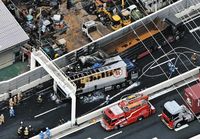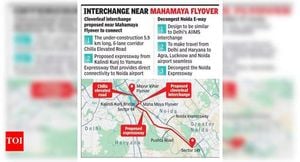In a tragic incident that unfolded on May 14, 2024, a large truck rear-ended a passenger car waiting in traffic on the Metropolitan Expressway near Bijo Kinzoku Junction in Toda City, Saitama Prefecture, resulting in three fatalities and three serious injuries. The Metropolitan Police Department's Traffic Investigation Division has now taken significant steps in the case, sending papers to prosecutors on April 9, 2025, against the former president of the transportation company Maruha Riki, located in Sapporo City, Hokkaido, for professional negligence that allegedly contributed to the accident.
The accident occurred around 7:35 AM when the truck, driven by 29-year-old Furuhata, collided with a line of cars, causing a chain-reaction crash that involved a total of seven vehicles. Eyewitness reports indicate that the truck was traveling at a speed of 75 to 80 kilometers per hour at the time of the collision, and the impact was severe enough to ignite several of the cars involved. The aftermath left three people dead and three others injured, raising serious concerns about the safety protocols in place at the trucking company.
According to investigators, the former president, aged 48, was aware that the truck driver had reported feeling unwell with a fever of over 38 degrees Celsius just a day prior to the accident. Despite this alarming report from the driver on May 13, the former president failed to take necessary precautions, such as arranging for a replacement driver or conducting a pre-operation roll call. This negligence is at the heart of the charges being brought against him.
In a statement to the police, the former president admitted to prioritizing the company’s sales over safety measures, saying, "We prioritized sales above all else, and safety measures were secondary. I regret it, but it’s not enough." This admission underscores a troubling trend within the transportation industry, where operational pressures can sometimes overshadow the imperative of safety.
The investigation revealed that the company had a history of inadequate management practices. The police found that the company had not routinely conducted roll calls, a critical safety measure, and in a review of 100 roll call records, it was discovered that 12 instances had no record of being conducted. Compounding the issue, some drivers were reported to have work hours exceeding 144 hours in a seven-day period, raising significant concerns about fatigue and the potential for dangerous driving conditions.
Furuhata, the driver involved in the crash, had been taking medication to manage his fever and was reportedly not in a fit state to operate a vehicle. He expressed during questioning that his last memory before the accident was seeing an electronic display board a few hundred meters ahead, indicating a possible lapse in attention due to his condition.
In the wake of this tragedy, family members of the victims have come forward to voice their anger and frustration at the circumstances surrounding the accident. At a press conference held in Tokyo on April 9, 2025, bereaved families called for accountability and stricter penalties for dangerous driving. Tomori, who lost her husband Yasuhiro Sugihira, aged 42, criticized the transportation company for its lack of action, stating, "The company handling large trucks has done far too little to ensure safety."
Another victim's family member, Megutsuko, who lost her husband Hirofumi Funamoto, aged 54, expressed her desire for more stringent legal consequences for drivers who operate vehicles while unfit, stating, "Instead of just blaming the company, we need to hold drivers accountable too, especially when they continue to drive while feeling drowsy or unwell."
The police investigation has highlighted systemic failures within the company’s operational management, including insufficient staffing and inadequate safety protocols. Experts have pointed out that the lack of a robust management structure contributed to the conditions that allowed such a catastrophic accident to occur.
As the case moves forward, the implications extend beyond this singular incident. The tragedy has reignited discussions about the broader issues of safety in the transportation industry, particularly regarding the pressures drivers face to meet tight schedules and the potential consequences of neglecting health and safety regulations.
In addition to the legal proceedings against the former president, there are calls from various advocacy groups for the government to implement stricter regulations that would compel transportation companies to prioritize safety over profits. This incident serves as a stark reminder of the critical importance of adhering to safety protocols and the devastating consequences that can arise when these standards are not met.
As the families of the victims continue to seek justice, the case stands as a crucial turning point for the trucking industry in Japan, highlighting the need for reform and better oversight to prevent future tragedies.








